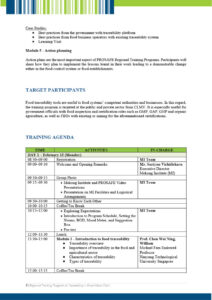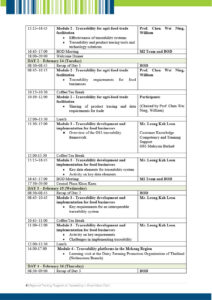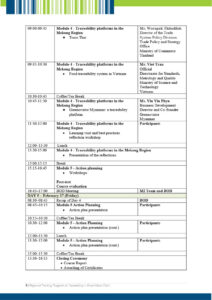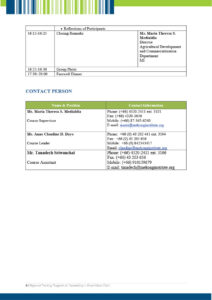
Food is a very sensitive commodity. It is perishable and sensitive to temperature. Due to various safety risks in the food chain, religious restrictions and cultural practices, consumers demand information about their food. Regulators also require significant amounts of information for trade facilitation and control. Quick and efficient information sharing and exchange is thus important for trade facilitation and in the management of food safety risks to achieve appropriate level of protection (ALOP). Various actors need to exchange information in the complex process of importing and exporting agri-food products. One key tool to facilitate information sharing and exchange about food in the supply chain from farm to table is traceability. Food traceability is also one of the 10 principles of the ASEAN Food Safety Policy.
Faced with the challenges of food safety emergency situations and the importance of food recall at both the national and global levels, many countries have implemented mandatory requirements on product traceability since 2004. It is expected that additional control measures and requirements are likely to be put into place in the future, given growing challenges in the food chain which extends beyond safety into sustainability and social considerations.
Traceability or product tracing applied in a food safety context does not in itself improve food safety outcomes unless it is combined with appropriate measures and requirements. It can contribute to the effectiveness and/or efficiency of associated food safety measures. Traceability is a tool that when applied in a food inspection and certification system can contribute to the protection of consumers against deceptive marketing practices and facilitation of trade on the basis of accurate product description.
Developing countries have become major food producers, exporters and food processing hubs. In ASEAN, countries like Cambodia, Lao PDR, Myanmar and Viet Nam (CLMV) have gained market access to developed countries for their agri-food products. They do face challenges at various stages of the food chain to prove compliance with food safety management requirements (domestic and international). One of the issues often raised by stakeholders in the food chain in the CLMV is traceability.
In its pursuit to contribute in improving the food safety measure in the Mekong region, Mekong Institute (MI), through its PROSAFE project, is organizing a Regional Training Program on Traceability in Food Value Chain on February 13-17, 2023 for relevant agri-food stakeholders in CLMV.
The five-day course is designed to contribute in improving the national food safety control system and food safety management system of food businesses in CLMV by strengthening traceability management system. Specifically, it aims to:
- Provide a background and overview of traceability measures in food safety and trade facilitation;
- Strengthen understanding on general food traceability requirements in food laws and for specific food groups;
- Increase awareness on product identification and management of information that facilitates traceability; and
- Enhance knowledge on traceability requirements for food business operators (FBOs).
Module 1 – Introduction to food traceability
This module will provide the basic concepts of traceability, as well as its importance in the agri-food value chain, highlighting food safety and identification. It will also provide the characteristics and types of food traceability.
Contents:
- Traceability overview
- Importance of traceability in the food and agricultural sector
- Characteristics of traceability
- Types of traceability
Module 2 – Traceability for agri-food trade facilitation
This module will emphasize traceability in international and regional trade facilitation such as the ASEAN Food Safety Policies and Principles. The sessions under this module also covers developments in the food traceability tools and systems from simple tagging to use of blockchain, plus the traceability requirements for FBOs.
At the end of the session, the participants will share their product tracing and data requirements for trade. Those from the government will present the common data standards for cross border facilitation, while FBOs will focus on their traceability information management.
Contents:
- Effectiveness of traceability systems
- Traceability and product tracing tools and technology solutions
- Traceability requirements for food businesses
- Sharing of product tracing and data requirements for trade
Module 3 – Traceability development and implementation for food businesses
GS1 traceability standard is widely used for supply chain identification. It provides the common language for traceability solutions to track products from the property to the consumer. At the moment, GS1 is being used by the existing traceability of the government agencies in Southeast Asia, including those in Thailand and Vietnam. For this module, an overview of the GS1 standard and its framework that defines minimum traceability system requirements for companies across industry sectors will be covered.
Contents:
- Overview of the GS1 traceability framework
- Key data elements and requirements for an interoperable traceability system
- Challenges in implementing traceability
Module 4 – Traceability platforms in the Mekong Region
Mekong countries are now working towards food traceability. However, they started developing a traceability platform in different periods. Some, like Thailand and Vietnam, already have sophisticated ones, and others are just starting their development such as Cambodia. In this module, representatives from Mekong countries will be invited to share their platform and experiences on developing and implementing traceability.
Case Studies:
- Best practices from the government with traceability platform
- Best practices from food business operators with existing traceability system
- Learning Visit
Module 5 – Action planning
Action plans are the most important aspect of PROSAFE Regional Training Programs. Participants will share how they plan to implement the lessons learnt in their work leading to a demonstrable change either in the food control system or food establishments.
Food traceability tools are useful to food systems’ competent authorities and businesses. In this regard, the training program is targeted at the public and private sector from CLMV. It is especially useful for government officials with food inspection and certification roles such as GMP, GAP, GHP and organic agriculture, as well as FBOs with existing or aiming for the aforementioned certifications.
Ms. Maria Theresa S. Medialdia (Course Supervisor)
Phone: (+66) 4320-2411 ext. 3101 Fax: (+66) 4320-3656
Mobile: (+66) 87-365-6240
E-mail: [email protected]
Ms. Anne Claudine D. Dayo (Course Leader)
Phone: +66 (0) 43 202 411 ext. 3104 Fax: +66 (0) 43 203 656
Mobile: +66 (0) 842343417
Email: [email protected]
Mr. Tanadech Sriwanchai (Course Assistant )
Phone: (+66) 4320-2411 ext. 3106 Fax: (+66) 43 203 656
Mobile: (+66) 910139679
E-mail: [email protected]






